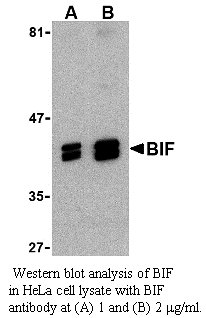Anti-Human Bif
Data
- -
- -
Antibody DetailsProduct DetailsReactive Species Human Host Species Rabbit Immunogen PN:B488 Product Concentration 0.5 mg/ml Formulation This polyclonal antibody is formulated in phosphate buffered saline (PBS) pH 7.4 containing 0.02% sodium azide as a preservative. Storage and Handling This polyclonal antibody is stable for at least one week when stored at 2-8°C. For long term storage, aliquot in working volumes without diluting and store at –20°C in a manual defrost freezer. Avoid Repeated Freeze Thaw Cycles. Country of Origin USA Shipping Next Day Ambient RRIDAB_2828213 Each investigator should determine their own optimal working dilution for specific applications. See directions on lot specific datasheets, as information may periodically change. DescriptionDescriptionSpecificity Rabbit Anti-Human Bif recognizes human and mouse Bif. This polyclonal antibody was purified using affinity chromatography. Background Apoptosis plays a major role in normal organism development, tissue homeostasis, and removal of damaged cells and is caused by the activation of proteolytic enzymes termed caspases. Proteins that comprise the Bcl-2 family such as Bax appear to control the activation of these enzymes. Bax activity was found to be regulated by its association with Bax-interacting factor 1 (BIF), a member of the endophilin B family that is associated with intracellular membranes.. Following this interaction, Bax undergoes a conformational change and translocates to mitochondrial membranes. The Bax/BIF interaction appears to be enhanced by apoptotic stimuli, suggesting that BIF acts as the trigger to activate Bax, and as suppression of BIF promoted HeLa cell colony formation in soft agar, it may have a role in the suppression of cancer progression. At least two isoforms of BIF are known to exist. PubMed References & Citations1. Lockshin, RA. et al. (2000) Cell Death Differ. 7:2-7. 2. Oltvai, ZN. et al. (1993) Cell 74:609-19. 3. Cuddeback, SM. et al. (2001) J. Biol. Chem. 276:20559-65. 4. Takahashi, Y. et al. (2005) Mol. Cell. Biol. 25:9369-82. Technical ProtocolsCertificate of Analysis |



